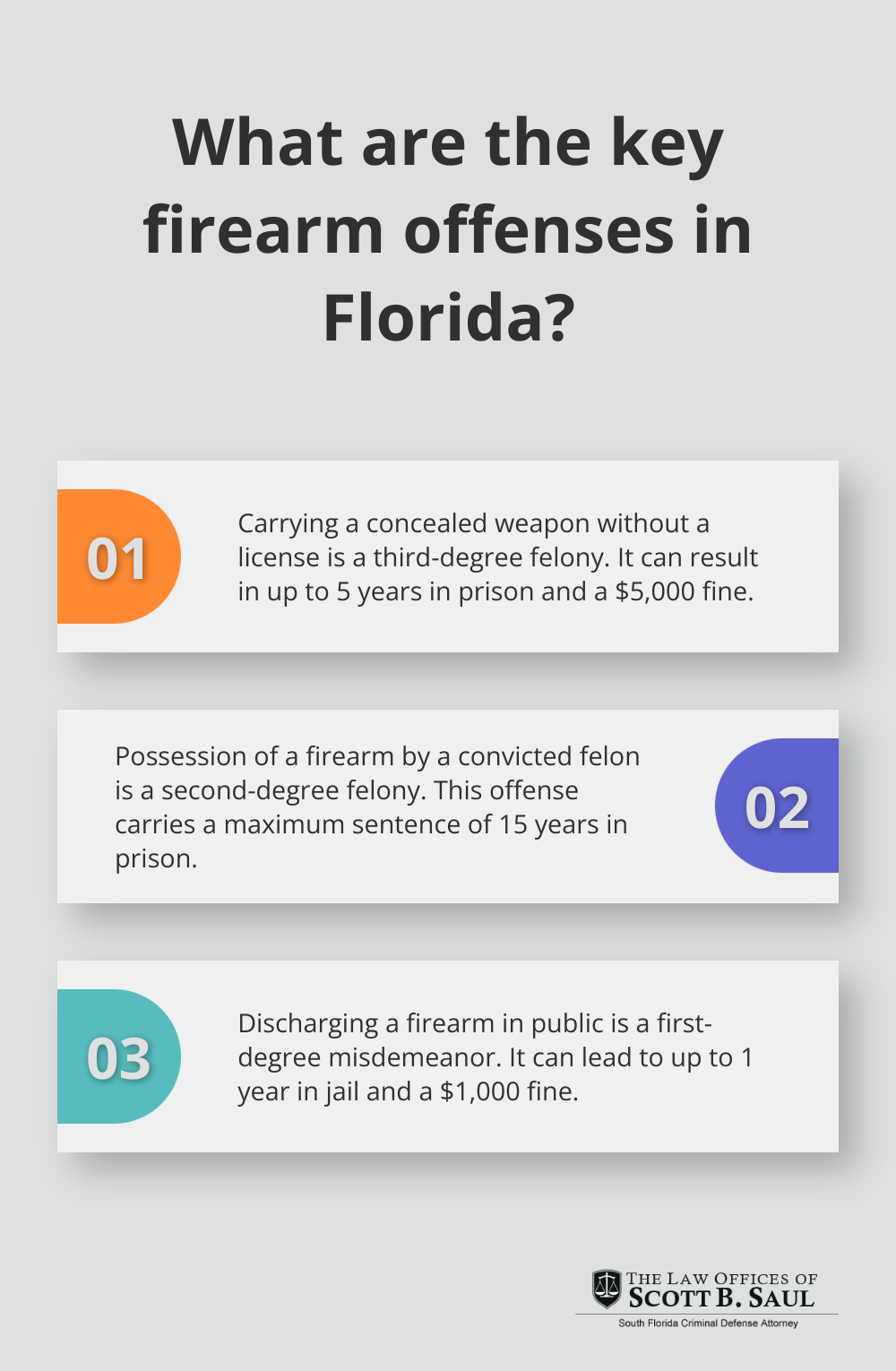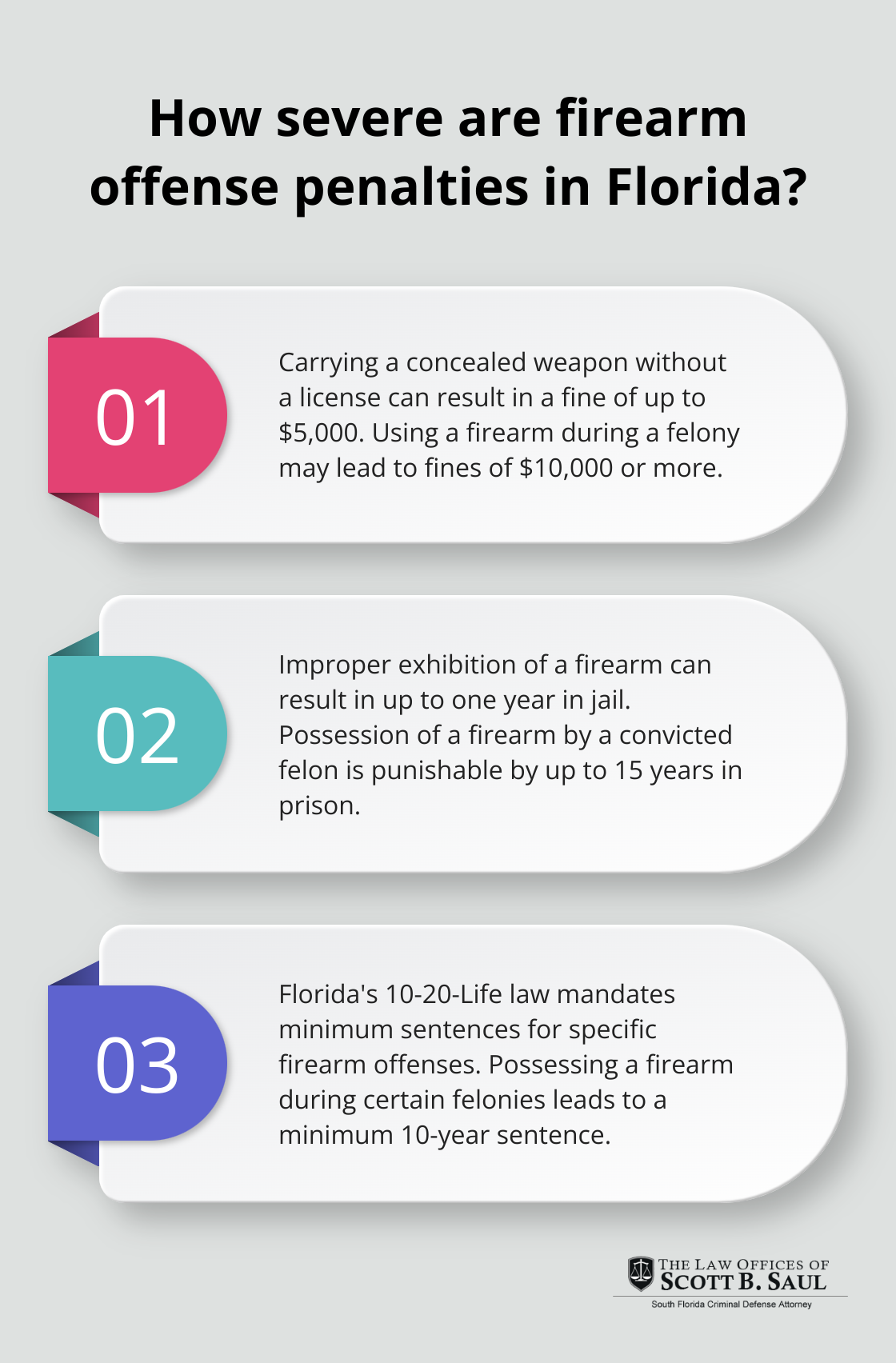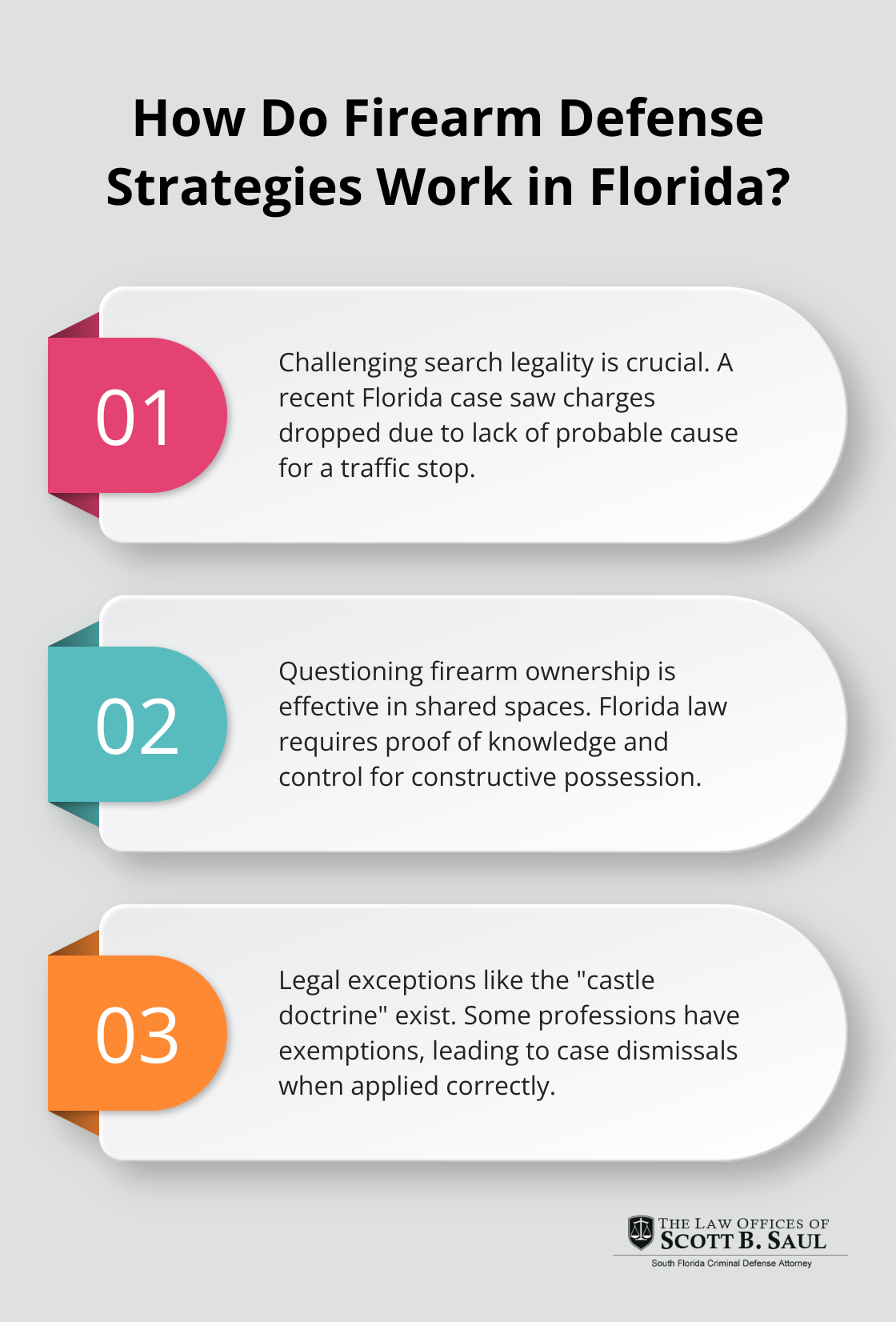Firearm Offenses: Legal Implications and Consequences
By : saulcrim | Category : Criminal Defense | Comments Off on Firearm Offenses: Legal Implications and Consequences
11th Jan 2025

Firearm offenses in Florida carry serious legal consequences that can impact your life for years to come. The complex web of state and federal laws surrounding firearms can be challenging to navigate.
At Law Offices of Scott B. Saul, we understand the gravity of these charges and the importance of a strong defense strategy. This post explores the legal implications of firearm offenses and outlines potential defense approaches to protect your rights.
Understanding Firearm Offenses in Florida
Definition of Firearm Offenses
Firearm offenses in Florida encompass a broad spectrum of illegal activities involving guns. These crimes range from improper possession to the unlawful use of firearms during criminal acts. The state’s laws define various offenses, each carrying specific penalties based on the nature and severity of the violation.
Common Types of Firearm Offenses
Carrying a Concealed Weapon Without a License
One of the most frequent firearm offenses in Florida involves carrying a concealed weapon without proper licensing. This offense results in a third-degree felony charge, which can lead to up to five years in prison and a $5,000 fine.
Possession by a Convicted Felon
Another prevalent offense is possession of a firearm by a convicted felon. Florida’s Uniform Crime Reports program has traditionally collected crime data in a summary format. Classified as a second-degree felony, this crime carries a maximum sentence of 15 years in prison.
Discharging a Firearm in Public
Discharging a firearm in public or on residential property constitutes a serious offense in Florida. This act (considered a first-degree misdemeanor) can result in up to one year in jail and a $1,000 fine.
Federal vs. State Firearm Laws
While Florida maintains its own set of firearm laws, federal regulations also play a significant role in gun-related offenses. Federal laws often impose stricter penalties and have a broader reach than state laws.

For example, the Gun Control Act of 1968 prohibits the transportation of firearms across state lines with the intent to commit a felony. Violations of this federal law can result in up to 10 years in federal prison.
Cases often arise where individuals face both state and federal charges for the same firearm-related incident. This dual prosecution can complicate legal proceedings and potentially lead to harsher sentences.
Recent Legislative Changes
Recent changes in Florida’s firearm laws have added complexity to the legal landscape. The new permitless concealed carry law, signed on April 3, 2023, allows individuals over the age of 21 who are not otherwise prohibited from possessing a firearm to carry concealed without a permit. However, this doesn’t mean all restrictions have been lifted. Individuals must still meet certain criteria to legally carry a firearm.
The intricacies of these laws underscore the importance of seeking experienced legal representation when dealing with firearm offenses. As we move forward, it’s essential to examine the specific legal consequences that these offenses can entail.
Legal Consequences of Firearm Offenses
Firearm offenses in Florida result in severe legal consequences that can dramatically alter an individual’s life. The penalties for these offenses serve as deterrents and vary based on the specific nature of the crime.
Financial Penalties
Financial repercussions for firearm offenses in Florida can be substantial. Carrying a concealed weapon without a license can lead to a fine of up to $5,000. More serious offenses, such as using a firearm during a felony, can incur fines of $10,000 or more. These fines often come with additional court costs and fees, which can add thousands of dollars to the overall financial burden.

The financial impact extends beyond fines. Legal fees, lost wages due to court appearances, and potential job loss can significantly increase the economic toll of a firearm offense.
Imprisonment and Probation
The duration of imprisonment for firearm offenses in Florida varies widely. Improper exhibition of a firearm (a first-degree misdemeanor) can result in up to one year in jail. Possession of a firearm by a convicted felon (a second-degree felony) is punishable by up to 15 years in prison.
Florida’s 10-20-Life law mandates minimum sentences for certain firearm offenses:
- Possessing a firearm during specific felonies: minimum 10-year sentence
- Discharging a firearm: 20-year sentence
- Causing injury or death: minimum 25 years to life
Probation often accompanies sentencing for firearm offenses. This typically involves regular check-ins with a probation officer, mandatory counseling, and restrictions on travel and associations.
Long-Term Personal Impacts
A firearm offense conviction affects various aspects of an individual’s life long after fines are paid or prison time is served.
Professional Consequences
A firearm offense conviction can severely limit job opportunities. Many employers conduct background checks and may hesitate to hire individuals with firearm-related convictions. Certain professions (particularly those requiring security clearances or involving work with vulnerable populations) may become entirely off-limits.
Personal Life Disruptions
A firearm offense can impact housing options, as many landlords conduct background checks. It can also affect child custody arrangements and immigration status for non-citizens.
Perhaps most significantly, a conviction for a firearm offense typically results in the loss of the right to own or possess firearms. This loss can be permanent unless specific legal actions restore these rights.
The severity of these consequences underscores the importance of skilled legal representation when facing firearm charges. Attorneys with experience in this area of law (such as those at Law Offices of Scott B. Saul) understand the nuances of Florida’s firearm laws and work to protect their clients’ rights and futures.
As we move forward, it’s essential to explore the defense strategies that can be employed to combat these serious charges and mitigate their potentially life-altering consequences.
Effective Defense Strategies for Firearm Charges
When facing firearm offense charges in Florida, a robust defense strategy is essential. Various approaches can protect a defendant’s rights and freedom. Here are some effective defense strategies to combat firearm charges:
Challenging the Legality of Search and Seizure
One of the most powerful defense strategies involves scrutiny of the methods law enforcement used to obtain evidence. Challenging the legality of the search and seizure, questioning the ownership of the firearm, and proving inadmissibility of evidence are key strategies. If the police conducted an illegal search or seizure, any evidence gathered may become inadmissible in court. This can lead to a dismissal of charges or a significant weakening of the prosecution’s case.

For example, in a recent Florida case, a court dropped charges against a defendant when it was proven that the officer lacked probable cause for the initial traffic stop that led to the firearm discovery. This underscores the importance of thorough examination of every aspect of the arrest and evidence collection process.
Questioning Firearm Ownership or Possession
Another effective strategy challenges the prosecution’s claim that the defendant actually owned or possessed the firearm in question. This defense can be particularly effective in cases where law enforcement found the firearm in a shared space (such as a vehicle with multiple occupants or a shared residence).
In Florida, the concept of constructive possession requires the state to prove beyond a reasonable doubt that the defendant had knowledge of the firearm and the ability to control it. Without clear evidence linking the defendant to the firearm, such as fingerprints or eyewitness testimony, it can be challenging for the prosecution to establish possession beyond a reasonable doubt.
Exploring Legal Exceptions and Exemptions
Florida law provides several exceptions and exemptions to firearm possession laws. For instance, the state’s “castle doctrine” allows individuals to possess firearms in their homes or vehicles for self-defense purposes. Additionally, certain professions (e.g., security guards or law enforcement officers) may have exemptions that allow them to carry firearms in situations where it would otherwise be illegal.
A skilled defense attorney will thoroughly investigate whether any of these exceptions or exemptions apply to their client’s case. In one instance, a court dismissed charges against a client when it was demonstrated that he fell under a professional exemption that the arresting officers were unaware of at the time.
Negotiating Plea Bargains
In some cases, the best strategy may involve negotiation of a plea bargain with the prosecution. This can potentially result in reduced charges or lighter sentences. For instance, a charge of possession of a firearm by a convicted felon might be negotiated down to a lesser charge of improper exhibition of a firearm, significantly reducing potential penalties.
However, it’s important to have an experienced attorney who can accurately assess the strength of the prosecution’s case and negotiate effectively on your behalf. The Law Offices of Scott B. Saul leverage extensive experience in both prosecution and defense to secure the best possible outcomes for their clients.
Challenging Ballistics Evidence
In cases involving the discharge of a firearm, challenging ballistics evidence can be an effective strategy. Ballistics analysis is not infallible, and errors in collection, storage, or analysis of evidence can occur. A skilled defense attorney will scrutinize this evidence and, if necessary, consult with independent experts to challenge the prosecution’s findings.
Final Thoughts
Firearm offenses in Florida carry severe legal consequences that can profoundly impact an individual’s life. From hefty fines and lengthy prison sentences to long-lasting personal and professional repercussions, the stakes are incredibly high. The complex interplay of state and federal laws surrounding firearms adds another layer of complexity to these cases, making it essential to have knowledgeable legal representation.

A robust defense strategy is necessary to approach these charges effectively. Challenging the legality of searches and seizures, questioning firearm ownership or possession, and exploring legal exceptions are tactics that can protect your rights and freedom. However, navigating these strategies requires in-depth knowledge of Florida’s firearm laws and extensive experience in criminal defense.
The expertise of a seasoned criminal defense attorney becomes invaluable in these situations. At Law Offices of Scott B. Saul, we bring decades of experience in criminal defense to your case. Our team provides personalized attention, comprehensive consultations, and aggressive representation to protect your rights (whether you’re a Florida resident or a tourist facing firearm charges). Don’t let a firearm offense derail your life – reach out to experienced legal professionals who can fight for your rights and work towards the best possible outcome for your case.
Archives
- July 2025 (2)
- June 2025 (9)
- May 2025 (9)
- April 2025 (8)
- March 2025 (9)
- February 2025 (8)
- January 2025 (9)
- December 2024 (10)
- November 2024 (5)
- July 2024 (2)
- June 2024 (2)
- May 2024 (2)
- April 2024 (2)
- March 2024 (2)
- February 2024 (2)
- January 2024 (2)
- December 2023 (2)
- November 2023 (2)
- October 2023 (2)
- September 2023 (2)
- August 2023 (1)
- July 2023 (2)
- June 2023 (2)
- May 2023 (2)
- April 2023 (2)
- March 2023 (2)
- February 2023 (2)
- January 2023 (2)
- December 2022 (2)
- November 2022 (2)
- October 2022 (2)
- September 2022 (2)
- August 2022 (2)
- July 2022 (2)
- June 2022 (2)
- May 2022 (2)
- April 2022 (2)
- March 2022 (2)
- February 2022 (2)
- January 2022 (2)
- December 2021 (2)
- November 2021 (2)
- October 2021 (2)
- September 2021 (2)
- August 2021 (2)
- July 2021 (2)
- June 2021 (2)
- May 2021 (2)
- April 2021 (2)
- September 2020 (5)
- July 2020 (4)
- June 2020 (4)
- May 2020 (4)
- April 2020 (5)
- March 2020 (4)
- February 2020 (4)
- January 2020 (4)
- December 2019 (1)
- November 2019 (4)
- October 2019 (4)
- September 2019 (4)
- August 2019 (4)
- July 2019 (5)
- June 2019 (4)
- May 2019 (4)
- April 2019 (4)
- March 2019 (4)
- February 2019 (4)
- January 2019 (4)
- December 2018 (4)
- November 2018 (5)
- October 2018 (5)
- September 2018 (4)
- August 2018 (4)
- July 2018 (7)
- June 2018 (4)
- May 2018 (4)
- April 2018 (8)
- March 2018 (4)
- February 2018 (4)
- January 2018 (4)
- November 2017 (4)
- October 2017 (4)
- September 2017 (4)
- August 2017 (7)
- July 2017 (6)
- June 2017 (4)
- May 2017 (4)
- April 2017 (4)
- March 2017 (4)
- February 2017 (7)
- January 2017 (4)
- December 2016 (7)
- November 2016 (4)
- October 2016 (4)
- September 2016 (10)
- August 2016 (4)
- July 2016 (4)
- June 2016 (4)
- May 2016 (4)
- April 2016 (4)
- March 2016 (4)
- February 2016 (7)
- January 2016 (4)
- December 2015 (5)
- November 2015 (4)
- October 2015 (7)
- September 2015 (4)
- August 2015 (4)
- July 2015 (13)
- June 2015 (9)
- May 2015 (8)
- April 2015 (6)
- March 2015 (4)
- February 2015 (4)
- January 2015 (4)
- December 2014 (4)
- November 2014 (4)
- October 2014 (4)
- September 2014 (3)
Categories
- Adjudication (1)
- Bankruptcy (1)
- Burglary Crimes (3)
- calendar call (1)
- Car Accident (1)
- Criminal Defense (333)
- Cyber Crimes (7)
- DNA (1)
- Domestic Violence (9)
- Drug Crimes (5)
- DUI (12)
- Embezzlement (1)
- Environmental Crimes (4)
- Expungement Law (2)
- Federal Sentencing Law (3)
- Firearm (3)
- Forgery (4)
- General (82)
- Healthcare (3)
- Immigration (1)
- Indentity Theft (1)
- Insurance (5)
- judicial sounding (2)
- Juvenile Crimes (4)
- Manslaughter (4)
- Money Laundering (3)
- Organized Crime (1)
- Racketeering (1)
- Reckless Driving (3)
- RICO (3)
- Sealing and Expunging (2)
- Sex Offense (1)
- Shoplifting (1)
- Suspended Driver's License (1)
- Traffic (4)
- Trending Topics (1)
- White-collar Offenses (1)

